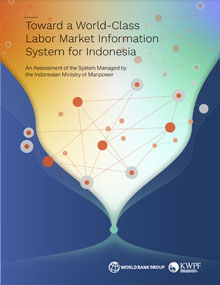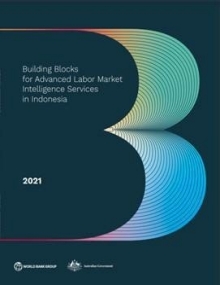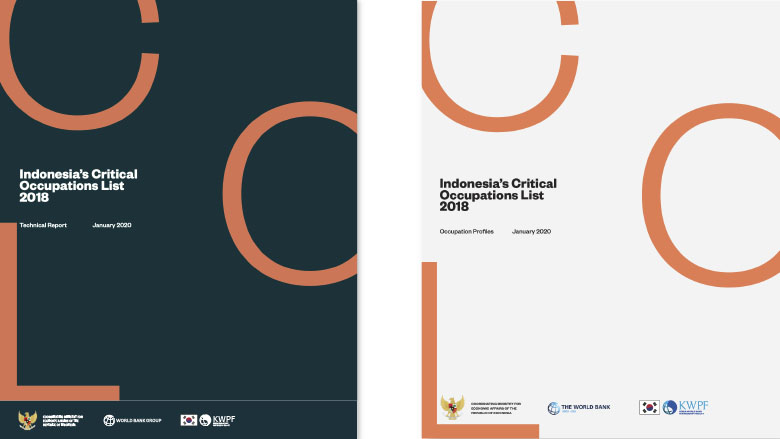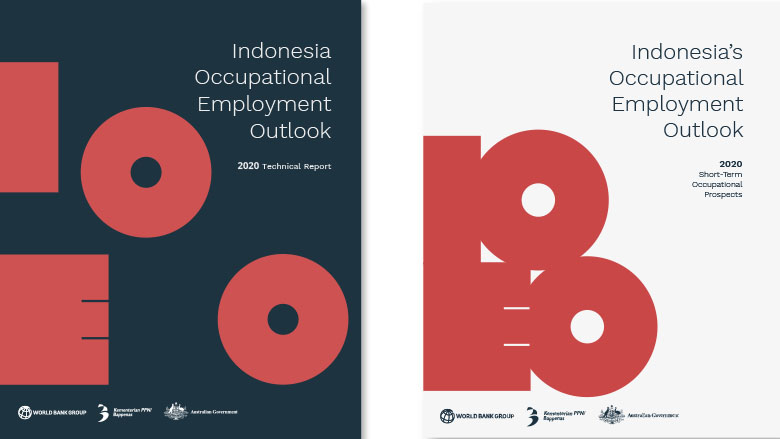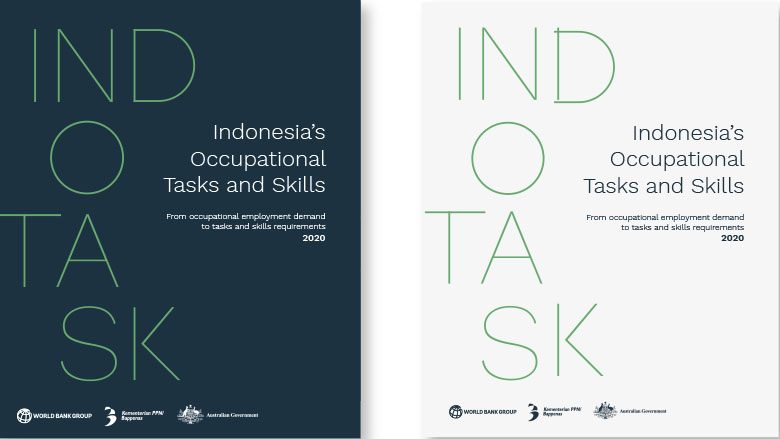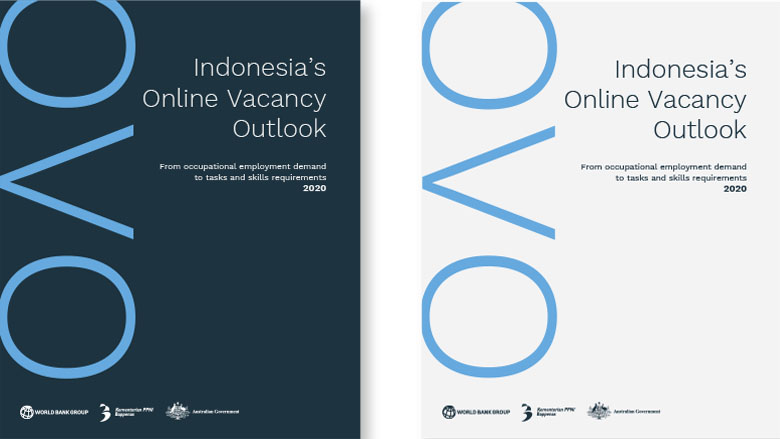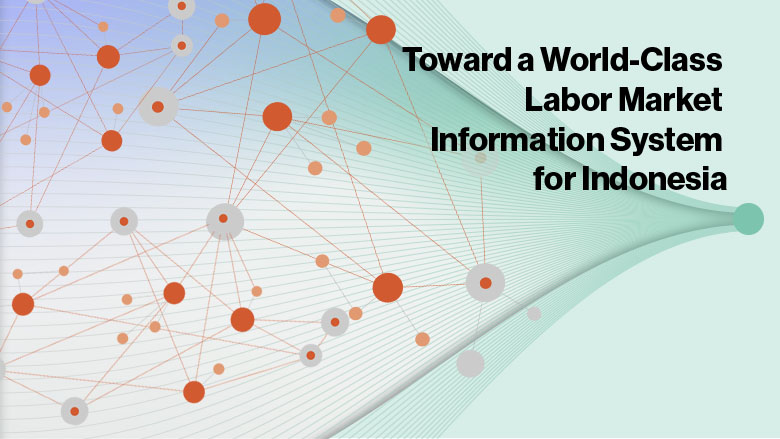
Download the infographic about the reports (.pdf)
Global megatrends and short-term shocks, including the 4th industrial revolution and the COVID-19 pandemic, are driving rapid changes in economic activities and jobs, which will require swift adaptations at the individual, enterprise, and policy levels. In countries like Indonesia, with a large population needing rapid skills upgrading and geographically fragmented labor markets, the risk of information gaps, and the costs associated with uninformed decisions are likely high. A well-functioning LMIS could play a central role in filling these information gaps, both today and tomorrow.
The recent introduction of the government’s Job Loss Guarantee (Jaminan Kehilangan Pekerjaan, JKP) unemployment insurance program calls for further improvements to the system. First, the JKP will provide three benefits: cash, training, and access to the LMIS – currently through the Employment Information System (Sistem Informasi Ketenagakerjaan, Sisnaker). Second, the JKP opens the opportunity to strengthen the linkages across the different programs and services provided by the Ministry of Manpower and the datasources. For example, beneficiaries of the JKP will need to enroll to benefit from online job matching, which in turn will lead to have more users of the tool and will call for improving its effectiveness. In this context, the implementing regulations of the JKP define the LMIS the digital ecosystem around the online platform for all public services and activities on labor provided by national and local governments.
To guide the reform efforts focused on developing a modern, effective, and efficient LMIS for Indonesia, the World Bank produced a series of reports which:
- define a framework of what constitutes an advanced LMIS,
- describe the main functions an LMIS should provide and its users,
- assess the current state of the Indonesian LMIS, and
- present four data pilots on occupations and skills that have been developed and tested as proof of concept to support the LMIS.
Assessment Reports
1. Toward a World-Class Labor Market Information System for Indonesia
The report proposes a framework that defines an advanced LMIS and identifies four key functions the LMI platform should provide.
“An advanced LMIS is a comprehensive system that collects, coordinates, and analyzes data and disseminates information to diverse stakeholders. For this, it needs to provide four key functions, or bundles of services, to assist its users in making decisions that improve labor market outcomes.”
Functions of and advanced LMIS:
- Job matching: Core services to help unemployed or employed workers—looking to improve their working situation—to identify job opportunities, and to help firms to reduce the cost of filling positions and close their skills gaps.
- Career and skills guidance: Services to help current and future workers identify the skills that are, or will be, in demand, their own aptitude and interest in different types of jobs. Successful career guidance services connect users with education and training opportunities.
- Government support: Services to help individuals and practitioners to identify and access relevant government programs (ALMPs, other skills-building programs, business support, social welfare programs).
- Labor market intelligence: Information services that provide private citizens, policymakers, practitioners, and researchers with comprehensive information on labor market outcomes and the impact of different policies and programs, with the purpose of informing investments in education and training and policy formulation.
These functions are closely linked and may sometimes overlap. They are provided through an ecosystem of digital platforms (websites).
The report takes a deep dive into AyoKitaKerja job-matching tool offered in 2019 as part of the SISNAKER. It benchmarks the matching tool against Korea’s Work-net, selected for being a good practice example of an advanced system. The report offers a roadmap and an action plan with concrete steps to increase the effectiveness of online job intermediation services. While the AyoKitaKerja has given room to KarirHub, the recommendations remain current and can be useful to the Ministry of Manpower in developing it.
2. Building Blocks for an Advanced Labor Market Intelligence Service in Indonesia
The report narrows in on one of the key LMIS functions: the provision of labor market intelligence through the LMIS-Hub, one of the LMIS digital platforms. The report explains the building blocks needed for a service-driven LMI-Hub tailored to a wide array of clients.
“Labor Market Intelligence is service-oriented information. It is not just “data” or “analysis”, but data and analysis produced and disseminated to help different users to make informed decisions.”
Occupations and Skills Data Pilots
An advanced LMIS-hub relies on multiple datasets, mainly labor market surveys and census data produced by government agencies. The World Bank, in collaboration with the government of Indonesia, has recently piloted four data collection initiatives to fill in current data gaps on occupations and skills. The pilots aimed at providing a comprehensive understanding of Indonesia’s occupational and skills supply and demand, beyond and above what is currently available. These pilots can be scaled up by the Ministry of Manpower (and Indonesia Statistics BPS) and incorporated into the LMI-Hub, serving both career development and labor market analytics functions.
Have a look at the pilots’ self-standing reports that provide in-depth methodological guidance as well as showcase results achieved:
